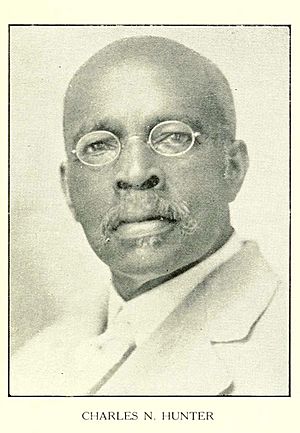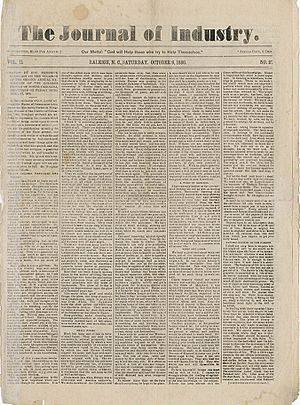Charles Norfleet Hunter facts for kids
Charles Norfleet Hunter (born around 1852 – died 1931) was an important American educator, journalist, and historian. He worked hard to improve life for Black people in the late 1800s and early 1900s.
When he was in his twenties, Hunter taught and was a principal at schools for Black students in cities like Durham, Goldsboro, and Raleigh. He also taught in smaller, rural schools. He even helped start the Berry O'Kelly Training School in Method, North Carolina.
Hunter wrote a lot! He sent many letters to newspapers and often wrote to important political leaders. He was a pioneer in starting newspapers for Black people in North Carolina. With his brother, Osborne Hunter Jr., he created the Journal of Industry. He also edited the Progressive Educator for Black teachers and The Appeal for African American readers. Hunter used his writing to show the problems Black people faced after slavery, like getting the right to vote, fair treatment, and good education.
Early Life and Education
Charles Norfleet Hunter was born around January 9, 1852, in Raleigh, North Carolina. He was about 12 years old when his family became free from slavery. Before this, his father, Osborne Hunter Sr., was a skilled carpenter. He was able to work for himself and pay his enslaver. Charles's mother's enslaver was William Dallas Haywood, a former mayor of Raleigh.
After his mother passed away in 1855, Charles and his siblings moved into the home of their enslavers. There, their enslaved Aunt Harriet cared for them. Charles remembered his Aunt Harriet as a very smart woman. Like other family members on his mother's side, she had learned to read and write well before slavery ended. This was amazing because, at the time, North Carolina laws made it a crime to teach enslaved people to read or write.
After the Civil War, Hunter went to schools for freed people in Raleigh. In 1874, he became an Assistant Cashier at the Raleigh branch of the Freedman's Savings Bank. After the bank closed, Hunter worked for the Internal Revenue Service.
In 1875, Hunter started his teaching career. He taught Black students in Shoe Heel, North Carolina (now called Maxton). Later, he taught in city schools in Durham, Goldsboro, and Raleigh. He also taught in rural schools in Wake, Chatham, and Johnston counties. In 1890, he became the Principal of the Garfield School. For a short time, Hunter also delivered mail for the post office. With help from a Republican congressman, James Edward O’Hara, Hunter became the Postmaster of Raleigh. He was the first Black man to hold this job. After a new president took office, Hunter left his Postmaster job. He then worked as a traveling agent for a company that sold textbooks to schools for African American children.
Hunter's Career and Contributions
Hunter's early work in newspapers was connected to his idea of creating a "State Fair" in North Carolina. This fair would celebrate the achievements of Black farmers, homemakers, inventors, and business owners. He and his brother, Osborne Hunter Jr., started the North Carolina Industrial Fair. This event showed the progress of African Americans in North Carolina.
Their newspaper, the Journal of Industry, promoted the work of the North Carolina Industrial Association. Its motto was "God will Help those who try to Help Themselves." The governor of North Carolina, Thomas Jordan Jarvis, spoke at the first "Colored State Fair" in 1879. The next year, Frederick Douglass, a famous anti-slavery leader, was the main speaker.
Later, Hunter wrote for the Raleigh Gazette and Raleigh Independent. These newspapers were for a Black audience. In the early 1900s, Charles Hunter began to research the history of the Black community in Raleigh. He wrote his own story, called Review of Negro Life in North Carolina with My Recollections, which was published in 1928.
Personal Life
Charles Hunter's exact birthdate is not clear from old records. Different records suggest he was born in 1851, 1852, or 1854. He married Eliza Hawkins from Warrenton, N.C. They had five children. Four of their children were Emma (born 1883), Eva (born 1887), Lena (born 1889), and Charles (born 1892). Eliza passed away in 1923. Charles Hunter died in Raleigh on September 4, 1932, and was buried there.
 | Stephanie Wilson |
 | Charles Bolden |
 | Ronald McNair |
 | Frederick D. Gregory |



